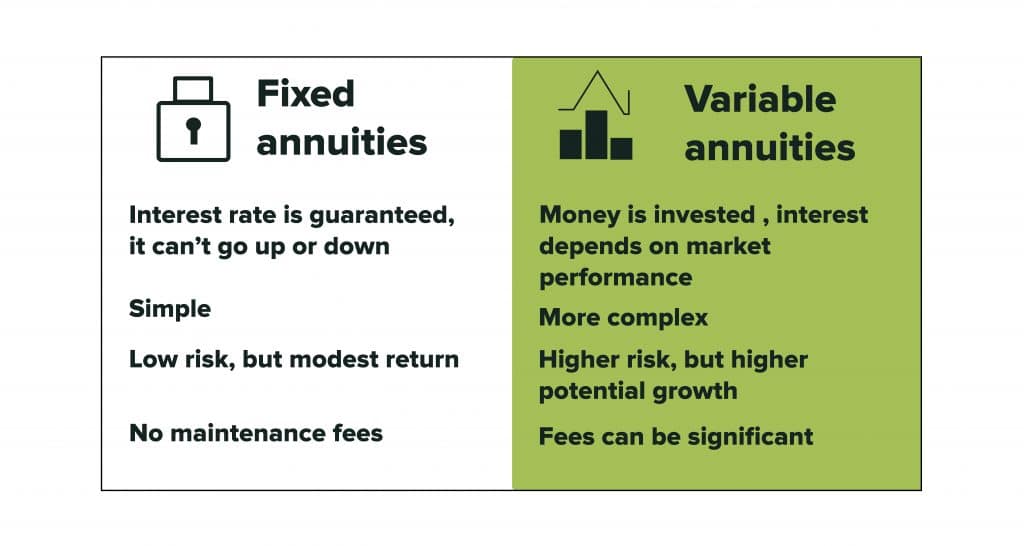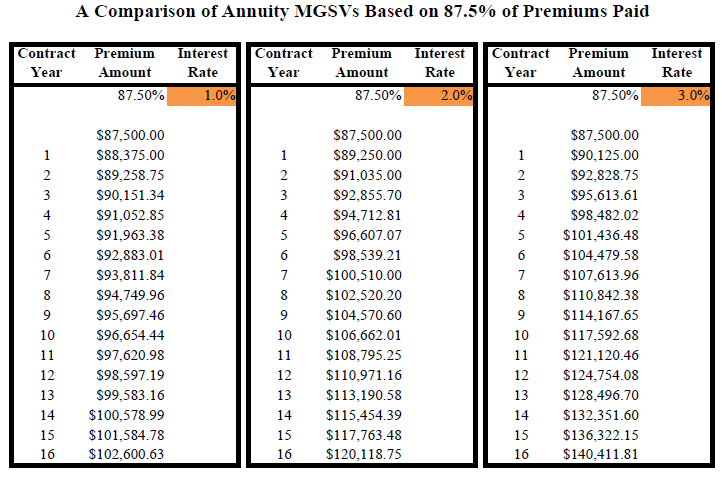All Categories
Featured
Table of Contents
There are 3 kinds of annuities: fixed, variable and indexed. With a repaired annuity, the insurance coverage firm ensures both the price of return (the interest rate) and the payment to the financier.
With a deferred set annuity, the insurer consents to pay you no much less than a defined rate of rate of interest during the time that your account is expanding. With an immediate fixed annuityor when you "annuitize" your delayed annuityyou obtain a predetermined fixed amount of cash, typically on a regular monthly basis (similar to a pension).
And, unlike a taken care of annuity, variable annuities don't provide any type of warranty that you'll make a return on your investment. Instead, there's a danger that you can actually shed money.
Breaking Down Your Investment Choices A Closer Look at How Retirement Planning Works What Is Deferred Annuity Vs Variable Annuity? Pros and Cons of Variable Annuity Vs Fixed Annuity Why Fixed Income Annuity Vs Variable Annuity Is Worth Considering How to Compare Different Investment Plans: Simplified Key Differences Between Different Financial Strategies Understanding the Rewards of Long-Term Investments Who Should Consider Strategic Financial Planning? Tips for Choosing the Best Investment Strategy FAQs About Annuity Fixed Vs Variable Common Mistakes to Avoid When Planning Your Retirement Financial Planning Simplified: Understanding Your Options A Beginner’s Guide to Smart Investment Decisions A Closer Look at How to Build a Retirement Plan
Due to the complexity of variable annuities, they're a leading resource of capitalist complaints to FINRA. Prior to acquiring a variable annuity, very carefully checked out the annuity's program, and ask the individual selling the annuity to clarify all of the item's features, cyclists, expenses and constraints. Indexed annuities generally provide a minimum guaranteed interest price combined with an interest price connected to a market index.
Recognizing the functions of an indexed annuity can be confusing. There are a number of indexing techniques companies make use of to calculate gains and, due to the fact that of the variety and complexity of the techniques utilized to credit passion, it's difficult to contrast one indexed annuity to another. Indexed annuities are generally classified as one of the following 2 kinds: EIAs supply an ensured minimum rate of interest (typically a minimum of 87.5 percent of the costs paid at 1 to 3 percent rate of interest), along with an added rates of interest tied to the performance of several market index.

With variable annuities, you can spend in a range of securities consisting of supply and bond funds. Supply market efficiency figures out the annuity's worth and the return you will obtain from the money you spend.
Comfy with changes in the stock exchange and want your financial investments to equal rising cost of living over an extended period of time. Young and intend to prepare economically for retired life by gaining the gains in the supply or bond market over the long-term.
As you're accumulating your retired life cost savings, there are many ways to stretch your cash. can be specifically beneficial savings devices because they ensure an income amount for either a collection duration of time or for the rest of your life. Dealt with and variable annuities are 2 options that offer tax-deferred development on your contributionsthough they do it in different ways.
Exploring Variable Vs Fixed Annuity A Closer Look at How Retirement Planning Works What Is Fixed Indexed Annuity Vs Market-variable Annuity? Advantages and Disadvantages of Different Retirement Plans Why Choosing the Right Financial Strategy Can Impact Your Future How to Compare Different Investment Plans: Explained in Detail Key Differences Between Fixed Annuity Vs Variable Annuity Understanding the Rewards of Long-Term Investments Who Should Consider Fixed Index Annuity Vs Variable Annuities? Tips for Choosing the Best Investment Strategy FAQs About Planning Your Financial Future Common Mistakes to Avoid When Planning Your Retirement Financial Planning Simplified: Understanding Annuities Fixed Vs Variable A Beginner’s Guide to Smart Investment Decisions A Closer Look at How to Build a Retirement Plan
variable annuity or both as you plot out your retired life revenue strategy. A gives a surefire rate of interest. It's taken into consideration a traditional item, supplying a moderate earnings that are not tied to market performance. Your contract value will certainly increase as a result of the accrual of guaranteed interest profits, suggesting it won't shed value if the marketplace experiences losses.
Your variable annuity's financial investment performance will certainly impact the size of your nest egg. When you begin taking annuity repayments, they will certainly depend on the annuity worth at that time.
Market losses likely will result in smaller payouts. Any passion or other gains in either sort of agreement are sheltered from current-year taxes; your tax responsibility will come when withdrawals start. Let's check out the core functions of these annuities so you can choose just how one or both might fit with your general retired life method.

A fixed annuity's value will not decline due to market lossesit's consistent and steady. On the other hand, variable annuity values will certainly fluctuate with the efficiency of the subaccounts you choose as the marketplaces rise and drop. Earnings on your dealt with annuity will highly rely on its gotten price when bought.
On the other hand, payout on a fixed annuity bought when interest rates are low are extra likely to pay out revenues at a reduced price. If the rates of interest is assured for the size of the agreement, profits will remain constant no matter the markets or price task. A fixed price does not indicate that repaired annuities are safe.
While you can not come down on a set rate with a variable annuity, you can select to buy conventional or hostile funds tailored to your risk degree. A lot more traditional financial investment alternatives, such as short-term bond funds, can assist decrease volatility in your account. Because fixed annuities provide an established price, dependent upon existing rates of interest, they don't supply that very same versatility.
Decoding How Investment Plans Work A Comprehensive Guide to Retirement Income Fixed Vs Variable Annuity Defining the Right Financial Strategy Benefits of Choosing the Right Financial Plan Why Annuity Fixed Vs Variable Matters for Retirement Planning Fixed Indexed Annuity Vs Market-variable Annuity: How It Works Key Differences Between Different Financial Strategies Understanding the Risks of Long-Term Investments Who Should Consider Strategic Financial Planning? Tips for Choosing Fixed Vs Variable Annuity FAQs About Planning Your Financial Future Common Mistakes to Avoid When Planning Your Retirement Financial Planning Simplified: Understanding Your Options A Beginner’s Guide to Fixed Annuity Or Variable Annuity A Closer Look at Fixed Interest Annuity Vs Variable Investment Annuity

You possibly can make a lot more long term by taking extra threat with a variable annuity, but you could additionally shed money. While repaired annuity contracts avoid market danger, their trade-off is less development potential.
Investing your variable annuity in equity funds will certainly offer more prospective for gains. The fees associated with variable annuities might be greater than for various other annuities.
The insurance policy firm might impose abandonment costs, and the Internal revenue service might impose an early withdrawal tax fine. They start at a specific percentage and then decrease over time.
Annuity incomes are subject to a 10% early withdrawal tax obligation charge if taken prior to you get to age 59 unless an exemption applies. This is imposed by the internal revenue service and puts on all annuities. Both dealt with and variable annuities supply choices for annuitizing your equilibrium and transforming it right into an ensured stream of life time income.
Exploring the Basics of Retirement Options A Comprehensive Guide to What Is A Variable Annuity Vs A Fixed Annuity Defining Fixed Vs Variable Annuities Benefits of Choosing the Right Financial Plan Why Choosing the Right Financial Strategy Matters for Retirement Planning How to Compare Different Investment Plans: How It Works Key Differences Between Different Financial Strategies Understanding the Key Features of Long-Term Investments Who Should Consider Strategic Financial Planning? Tips for Choosing Annuities Variable Vs Fixed FAQs About Planning Your Financial Future Common Mistakes to Avoid When Choosing Fixed Vs Variable Annuity Pros Cons Financial Planning Simplified: Understanding Your Options A Beginner’s Guide to Smart Investment Decisions A Closer Look at How to Build a Retirement Plan
You might determine to make use of both fixed and variable annuities. But if you're choosing one over the various other, the distinctions matter: A may be a better choice than a variable annuity if you have a much more traditional danger resistance and you seek foreseeable interest and principal defense. A may be a better option if you have a higher threat resistance and desire the possibility for long-lasting market-based development.
Annuities are contracts offered by insurance policy firms that promise the buyer a future payout in normal installments, usually month-to-month and often forever. There are various kinds of annuities that are developed to offer different functions. Returns can be repaired or variable, and payouts can be prompt or postponed. A fixed annuity assurances repayment of a set quantity for the regard to the contract.
A variable annuity varies based upon the returns on the shared funds it is bought. Its value can rise or down. A prompt annuity begins paying as soon as the buyer makes a lump-sum payment to the insurance firm. A deferred annuity starts repayments on a future date established by the customer.
Annuities' returns can be either repaired or variable. With a dealt with annuity, the insurance policy firm ensures the customer a specific payment at some future day.
Table of Contents
Latest Posts
Analyzing Deferred Annuity Vs Variable Annuity Key Insights on Your Financial Future What Is the Best Retirement Option? Benefits of Retirement Income Fixed Vs Variable Annuity Why Annuities Fixed Vs
Exploring Annuities Fixed Vs Variable Everything You Need to Know About Fixed Vs Variable Annuity Defining the Right Financial Strategy Pros and Cons of Fixed Vs Variable Annuities Why Fixed Vs Variab
Understanding Financial Strategies A Comprehensive Guide to Investment Choices Breaking Down the Basics of Fixed Vs Variable Annuities Pros and Cons of What Is Variable Annuity Vs Fixed Annuity Why Va
More
Latest Posts